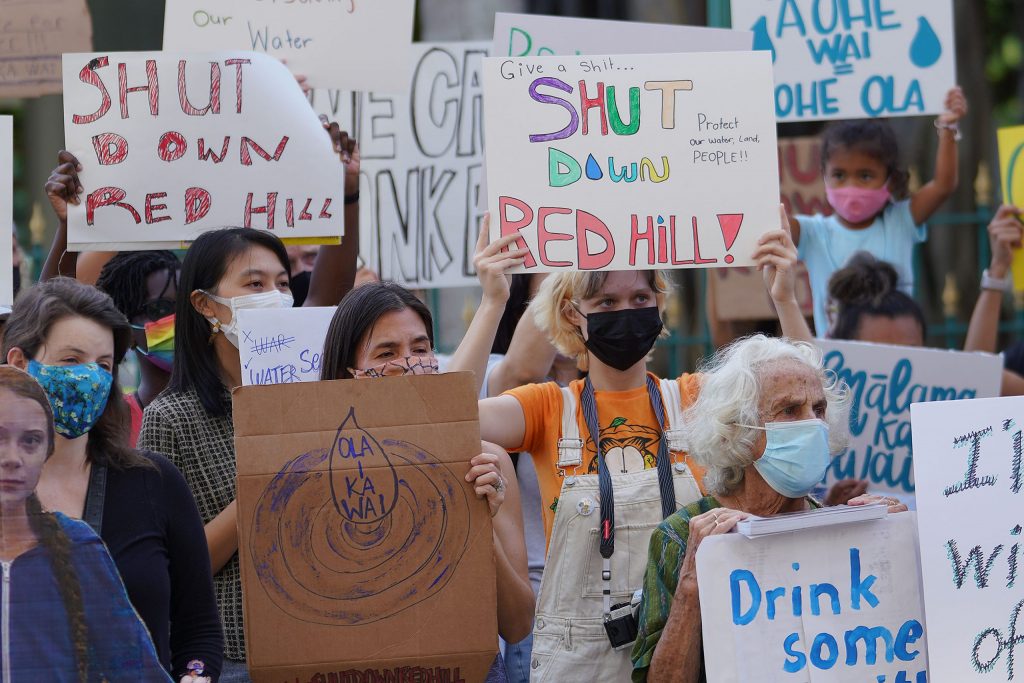After more than a month of fierce struggle, water protectors in O‘ahu have won a first victory over the U.S. Navy. On January 10, the navy finally agreed to defuel the Red Hill fuel storage tanks, which poisoned a main water source on O‘ahu. They agreed to go along with an order issued by the Department of Health on January 3. The Indigenous-led Shut Down Red Hill movement forced this concession, but there are still many reasons that the fight against the navy’s occupation of O‘ahu must continue.
Since news first broke in November that the U.S. Navy Red Hill Bulk Fuel Storage Facility had been leaking jet fuel into a freshwater aquifer on O‘ahu, the military has resisted any accountability. Groups like the O‘ahu Water Protectors and Ka‘ohewai quickly took up the fight to rally the larger O‘ahu community around the demand to shut down Red Hill, and they successfully brought the issue to the attention of the larger climate movement. The movement gained public attention by holding protests outside the Hawai‘i State Capitol and the headquarters of the U.S Navy Pacific Command. They highlighted the bipartisan support for the U.S. military and how the material interests of politicians and businesses are what enable the military to harm the O‘ahu community. Much of the movement’s strength came from its emphasis on organizing the community to wage struggle rather than relying on the empty promises of politicians.
Eventually, opposition to the U.S. military gained so much support that even state officials were forced to publicly align with the movement’s demands. But even when the state officials demanded defueling, the navy’s first instinct was to openly reject the demand, a testament to how much the military is used to its impunity and how little concern it has for the health of the communities it occupies.
Given how easy it has been for the navy to resist the opposition up until this point, it is possible it has announced that it will comply with the Department of Health mandate only to weaken public attention.
The climate movement must remain focused on O‘ahu, and widespread support for the movement must expand to include support from the working class and social movements of oppressed communities. The poisoning of water is not just a climate issue; it affects the working-class families who will have to drink that water. Moreover, it connects with the Black communities in the U.S. whose water has also been poisoned. While the movement on the ground has already shown its own strengths, it is still up against the largest military in the world. Workers in O‘ahu should organize a strike in solidarity with the demands of the Shut Down Red Hill movement. Leaders and social movements of communities that have faced off against powerful institutions, such as immigrant rights activists who fight ICE or abolitionists who fight police departments, can begin to exchange lessons and actions in solidarity with the Shut Down Red Hill movement.
Additionally, those who support the demand to shut down Red Hill should also support more radical demands for climate justice. One demand to put forward should be that the O‘ahu community get to determine how to most safely defuel the tanks and permanently shut down Red Hill, not the military. The U.S. Navy should be forced to pay directly out of its budget for the full process of defueling the tanks and cleaning up of contamination, but it should have no say in what that process looks like. Additionally, the navy must be forced to pay the full cost of medical expenses of everyone it poisoned and pay for the full replacement of contaminated infrastructure such as pipes, directly out of its budget.
Even if all these demands are met, there will not be full justice to Native Hawaiians until the U.S. military is forced out of Hawai‘i for good. The U.S. military illegally annexed Hawai‘i in 1893 in order to further militarize the Pacific. The violence and destruction the military inflicts on Native Hawaiians can also be seen in U.S. military occupations throughout the Pacific, such as in Okinawa and Guam. Support for the Shut Down Red Hill movement should be part of a larger movement to demilitarize the Pacific and resist all U.S. military occupations.
The O‘ahu Water Protectors have already begun acknowledging that the U.S. Navy’s statement that it will comply with defueling cannot be taken at face value and that it is essential for the opposition to remain strong. They are remaining firm in their demand that Red Hill be fully shut down, not relocated or updated. Many of the movement’s leaders also call for the full end to U.S. military occupation of Hawaiian land. Every supporter of the Shut Down Red Hill movement should show full solidarity with this stance.
The Shut Down Red Hill movement has shown that by directly acknowledging the danger of the U.S. military and complicity of state officials, key demands can be won, even against the U.S. military. The Left, the climate movement, and the working class must stand in solidarity with the movement and apply its lessons to other struggles against institutional polluters and imperialism.











